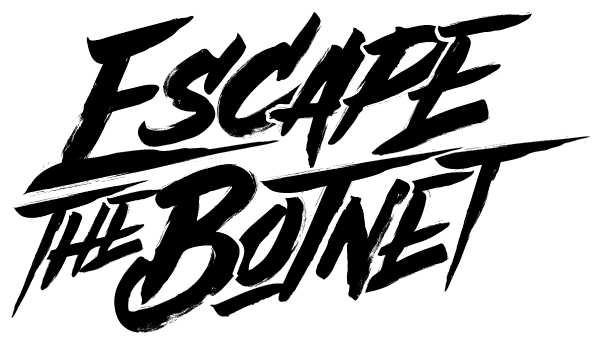
How to escape the botnet?
This post and the contents within this website were ultimately inspired by the article written by Michael Matheson Miller, in his ten step guide Escaping the Botnet: A Practical Guide and YouTuber Mental OutLaw in his video covering that same article. Video.
As a millennial, all I’ve ever known was progression, from the inevitable progression of technology to the unquestionable progression of culture. We’ve been sold a narrative that automation is forthcoming, even as we’ve seen that automation doesn’t always protect autonomy. It’s interesting that we’ve accepted such a narrative… or better yet, some have.
At times, when looking at our relationship with technology I’m reminded of the lessons within the book ‘Dune’. In it’s story, humanity was once enslaved by other humans who controlled Thinking Machines (A.I.). What was introduced as a means of convenience became a means of subjugation. The trauma from this experience were felt so deeply within human bones, that when humanity finally concluded their “struggle against oppression” , they chose to ban all Thinking Machines and instead relegate those task back to humanity. Humans became the supercomputers and computers became a supplement to humanity.
The idea is that it is better to work with technology than to let it become your master. Your information one day may be worth more than oil and who ever controls that information may become the new masters of the world… Scary stuff to think about and yet it has to be entertained.
Below is a condensed version of the ten step guide written by Michael Matheson Miller:
To properly Escape the Botnet one has to be proactive to the point in which they are essentially a cybersecurity expert. Realistically, this will not be obtain by everyone, but even so the act of doing nothing is more consequential than trying.
1. Embrace encryption
This includes both text and emails.
Email: As you probably know by now, most Big Tech companies typically do not respect individual privacy. When using free email services, or matter of fact, anything free, you always have to remember that you are the product. Your data becomes an easily accessible gold mine, where services like Gmail or Yahoo acts like the tycoon financing the gold rush and lodging the prospectors. This is why taking the time to secure your communication is important.
In this case, Proton Mail or any other encrypted email services will be a better option than a standard free email service. With Proton Mail specifically, they offer encrypted messages between users, the body of messages are encrypted (subjects lines are not encrypted), and their servers are housed in Switzerland (which has some of the strictest privacy laws in the world).
Text Messaging: Your phone number (and subsequently more date) and your communication can easily be seen by any authority or individual who has inquiry to look. Given this finding the best messaging service utilizing encryption becomes important. Internet providers and Big Tech giants like AT&T, Verizon, Apple, Google, and Meta are all tracking your text. To add further complications to this every Big Tech company must give back door access to the government, so they are also tracking your text.
Encrypted text messaging services like Signal or even Telegram would be the best solution to this. They do not collect data and they use end-to-end encryption that protects messages from interception.
There’s even a famous case, where signal was asked to provide user data to the FBI but there was little to hand over Fed’s Secretly Subpoenaed Signal.
2. Use a vpn
VPN’s are utterly essentially when surfer the internet. You need a VPN on your laptop, desktop, and your mobile phone. They simply allow your IP address to become untraceable, this can give you access to websites once hidden from you or allow to escape constant tracking from ads and internet providers.
There are many VPN providers and if you are active on YouTube you’re already probably familiar with Express VPN. This service works well and any other service that gets the job done will work just as well too.
3. use browsers and search engine that respect privacy
With out a question use Brave Browser. Brave was founded on privacy and individual control. First, Brave states that it doesn’t keep record of internet activity. Second, the web browser comes equipped with an ad-blocker, Third, it gives you the option to monetize off ads… Let me explain. Let’s say you don’t mind receiving relevant advertisement or you don’t mind supporting creators, Brave gives you the ability to make money off the ads they push to you, since you’re the product, you deserve a cut. You get to control the nature of the ads and the frequency in which they are distributed to you, you are paid in crypto, and you can even tip content creators through the internet.
Brave also has its own search engine, which is the go to choice for surfing the internet. No matter what your position is on the conflict in Ukraine, what became clear is that in wartime, information becomes harder to obtain. We saw many search engines begin to filter search results, only a select few chose not to. Brave being one.
4. own your material
This includes files, personal contact information, and web presence (website).
When it comes to securing your own files, learn more about personal servers and blockchain based decentralized servers. As these are the best ways to utilize storage.
Backup your contact information and never rely 100% on a provider. Finally when developing an internet presence, use services like WordPress, where you can have the most control over your business.




